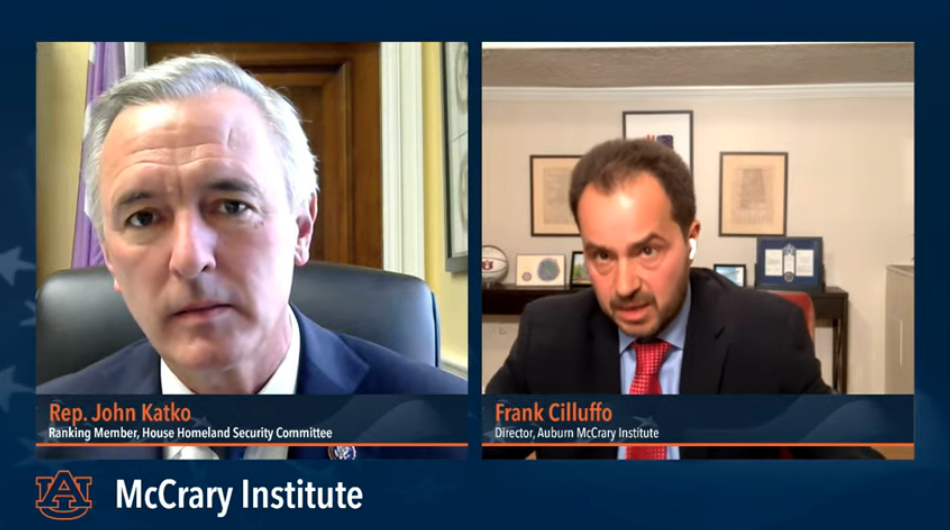Rep. John Katko discusses interconnectivity of cyber and homeland security in virtual session hosted by Auburn University
Article body
The evolving landscape of cyber infrastructure and homeland security took center stage Tuesday as Auburn University’s McCrary Institute for Cyber and Critical Infrastructure Security hosted Rep. John Katko, R-N.Y. and ranking member of the U.S. House Homeland Security Committee, during a virtual session.
“One of the biggest threats to homeland security right now is cyber—there’s no question about that,” Katko said. “It’s a cause for great collaboration and it’s quintessentially bipartisan and one of the reasons I’ve been so attracted to homeland security is that I like trying to get things done. To me, being bipartisan can’t be better explained than in the cyber realm.”
Katko has served a number of leadership roles during his time on the House Committee on Homeland Security before being named the ranking member in December. He cited several top priorities for the committee, including “rethinking our fragmented approach to ‘dot gov’ security by consolidating security within the Cybersecurity and Infrastructure Security Agency; developing the understanding of the nature and extent of third-party risks; reducing that risk through a certification regime that, instead of just creating perfunctory compliance exercises, actually works and is workable; driving better software insurance development across the entire system; and the fifth, and perhaps the most important, imposing real costs on our cyber adversaries like China, Russia, North Korea and Iran,” he said.
Moderated by McCrary Institute Director Frank Cilluffo, the hour-long conversation highlighted the cyber threats posed by countries such as Russia and China, strengthening the authority of Cybersecurity and Infrastructure Security Agency, or CISA, and the need to increase collaboration between government agencies and the private sector with regard to reporting and addressing cyber incidents. Katko estimated that CISA only receives notice of a small fraction of all the data breaches that occur in the U.S.
“How can you properly craft better defenses and best practices when you’re not getting information from the private sector to do that?” he asked. “Information sharing amongst agencies has to be turbocharged but we also have to make the private sector feel comfortable enough to share the information with us.”
Cilluffo distilled the idea of a public-private partnership around cyber security down to trust, and Katko agreed.
“The more you can have the cross-collaboration, the better because we can’t do it alone and the private sector can’t do it alone,” Katko said. “We need each other and it’s got to involve a lot more trust.”
A full recording of the conversation can be viewed here.
The McCrary Institute is focused on practical, interdisciplinary research and innovation in infrastructure and cybersecurity. Founded through a gift from the Alabama Power Foundation in 2014, the institute is tasked with developing next-generation technologies aimed at improving the security and operation of the nation’s infrastructure.
Related Media
Media interested in this story can contact Communications Director Preston Sparks at (334) 844-9999 or preston.sparks@auburn.edu.
Auburn University is a nationally ranked land grant institution recognized for its commitment to world-class scholarship, interdisciplinary research with an elite, top-tier Carnegie R1 classification, life-changing outreach with Carnegie’s Community Engagement designation and an undergraduate education experience second to none. Auburn is home to more than 30,000 students, and its faculty and research partners collaborate to develop and deliver meaningful scholarship, science and technology-based advancements that meet pressing regional, national and global needs. Auburn’s commitment to active student engagement, professional success and public/private partnership drives a growing reputation for outreach and extension that delivers broad economic, health and societal impact.





